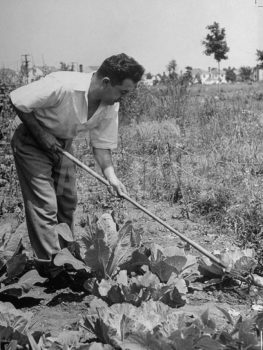 This blog is not intended to be a political commentary – and yet, in light of recent events here in the U.S., how can it not be – and as a citizen of the world on this lonely planet Earth, how can we not become political – or at the very least, outraged — when we witness so much destruction that could mean the end of our very existence? It is overwhelming. It seems there is little we, as individuals, can do. And yet, that is not true. We can, indeed, turn things around – but like all worthwhile efforts, it will take work and due diligence. And so, this blog post (as it turns out, because I don’t always know when I begin) is a call to action.
This blog is not intended to be a political commentary – and yet, in light of recent events here in the U.S., how can it not be – and as a citizen of the world on this lonely planet Earth, how can we not become political – or at the very least, outraged — when we witness so much destruction that could mean the end of our very existence? It is overwhelming. It seems there is little we, as individuals, can do. And yet, that is not true. We can, indeed, turn things around – but like all worthwhile efforts, it will take work and due diligence. And so, this blog post (as it turns out, because I don’t always know when I begin) is a call to action.
But wait. Mixing gardening and politics: is it not a form of blasphemy? The garden is our safe haven – that place we go to when we want to escape all that negative friffra out there (is that not a word? it should be) – that place we go to when we literally want to get back to our roots – to get down on the ground, get our knees dirty, smell the soil, sink our hands into the earth, and plant something. Anything. And yes, Everything. It’s also that place we go to when it feels so good to just bust ass and see some results out of all that energy, as opposed to connecting your fist with something that hurts. It is an act of hope, defiance, and resilience. It is raw, unapologetic, real. Everything fighting for survival while also relying on each other for survivability.
It is so many things – but it is Not politics, right?
Read on, friends….
True, we need this reminder that we are something very small in a world where a billion bacteria, thousands of protozoa and nematodes, and yards and yards of fungal filaments can be found in a single teaspoon of soil, and the humbling reminder that we, with our clumsy, gargantuan feet, can destroy it all in a single footstep.
We can build, create, nurture … we can also exploit and destroy.
Is it a burden to be cognizant of this power? Unlike many animals, we, with this knowledge, must make a choice.
My recent post about putting together a garden journal was an attempt to get away from the politics and return to the tasks at hand, but I realized in the process, it was still about politics, how we choose to live, where we focus our energies, what we accomplish, and how we work toward our dreams and ideals. In the end, we have a documentation of that journey…and every year is different. Every year, our gardens teach us something new. Indeed, our gardens give us an opportunity to do something powerful.
The Power of Gardening
The time is right. We are now emerging from the “Persephone Days,” which, according to Eliot Coleman, is that time when we receive less than 10 hours of sunlight, i.e., that dormant time of winter. Persephone is a Greek mythology reference to the vegetation goddess who was captured by Pluto, ruler of Hades, the underworld, and forced to stay there for a third of the year, during which time, nothing grew. (At our latitude, the Persephone Days run from about October 31 to mid-February.) We watch the increase in light with great anticipation. This is that turning point when the plants face the sun, tiny seeds miraculously spring to life, and the whole world around us suddenly explodes in color.
Will we be ready?
How will we best use this time?
I, for one, see it as an opportunity to bring back some sanity to my world. Is that too big a goal?
Yes, the garden can be an excellent hiding place – a place to listen to birds and insects, for quiet introspection, and a place for rejuvenation. It can be our own little La-la Land, and believe me, I know, we all need this. In the process, though, it can also be a place to make a huge difference. It can be a place to work really hard and see results. If I may be so bold, to save the world. One garden at a time. All over the place.
“What is she talking about,” you ask?
Victory Gardens
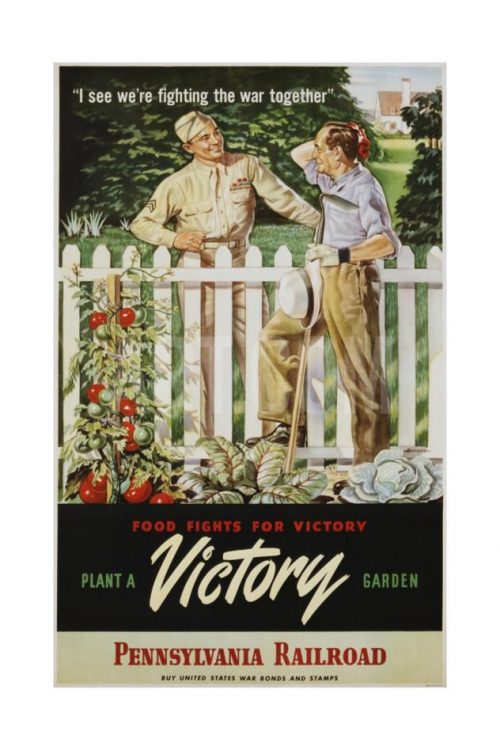 This was the battle cry during WWI and WWII – and our forefathers had the right idea. I can hear my father telling me, “Everyone gardened back then. If you didn’t garden, you didn’t eat….”
This was the battle cry during WWI and WWII – and our forefathers had the right idea. I can hear my father telling me, “Everyone gardened back then. If you didn’t garden, you didn’t eat….”
They were called “war gardens” or “food gardens for defense.” Peoples’ efforts at home relieved funds for other uses (read that, military). People all over the U.S., Canada, Great Britain, and Australia – and likely elsewhere as well – took up their shovels as an act of patriotism. At one point, there were more than 20 million Victory Gardens planted across the U.S. alone. By 1944, Victory Gardens were responsible for producing 40% of all our vegetables, which amounted to, get this: more than a million TONS of produce over the course of the war. All in little plots here, there, and everywhere. Some in window boxes; others on rooftops; some at schools, which supplied school lunches; others in parks – and yes, thank you Eleanor Roosevelt (and Michelle Obama), even on the White House lawn. Think about that.
Victory Gardens were considered integral to the war effort. Our circumstances today may be different, but make no mistake about it…we ARE at war here – a war with a changing climate that is already altering life as we know it, with increased weather extremes, drought, floods, changing migration patterns of birds, and changes in insect populations. In addition, we have a U.S. political administration that is shaking a tiny fist at leaders around the world, threatening to put us at military showdowns with our friends, and exacerbating relations with those already on shaky grounds. The insecurity created by current world events puts us in a very vulnerable position. It is a great motivator to act now to ensure that our food supply does not depend on cross-country transportation systems.
What Can We Do?
Speak out – yes, we must follow our true North, especially when lies and agendas threaten to change our direction – speaking up can make a difference – but we must also ensure that we do not fall into the trap of name-calling that only serves to widen the chasm, and instead, focus our energies toward offering real solutions.
Hunker down – yes, that, too – but again, not in the sense of sticking our heads in a mound of sand, but rather as a means for positive change.
Just as they did during WWII, there is a lot that we, as individuals, can do to better society and to even change the world – right here at home – by bearing arms with shovels, not with guns.
Bring Back the Victory Garden
The fact is, it is dangerous to rely on – nor can we afford – a food system that contributes to global warming through the tilling up of thousands of acres of soil. This is a system that further compounds the problem by necessitating petroleum-based transport across thousands of miles to reach the people who consume an end product that provides minimal nutritional value. The costs are astronomical on so many levels and continue to be subsidized at our expense.
Victory Gardens for Self Defense, Self-Reliance, and as a Means of Effecting Climate, Economic, and Social Change
The way to change big Ag? Refuse to support it. If we planted intensive gardens in every back yard, on every porch, in every little spot of green space in public areas … if schoolyards and churchyards and prison yards were gardened to feed the poor and the hungry … if every square inch were covered if not something for us, then something for the bees and other pollinators and wildlife – what kinds of changes would we see? Well, for starters, recent studies show that we could sequester more than 100% of current annual CO2 emissions just by switching to regenerative agricultural practices. Will we convert big Ag? Not right away, but in the meantime…
There Is No Better Time to Plan a Victory Garden
January / February is planning season. Planning, by definition, requires a lot of forward thinking. We gardeners are eternal optimists, always with a vision in mind of what we want to create and what will take on a life of its own with a little help from our hands. We are a self-sufficient bunch, recognizing that this connection with the earth is about much more than growing a few herbs, fruits, and vegetables; it is about life itself and the interconnectedness of all things. In striving toward greater independence and a more ecological way of being, we are making an impact that, together with all the other gardeners out there building intensive backyard ecosystems, has the potential to make a cumulative difference. We envision something for our grandchildren, along with this year’s bees in zinnias.
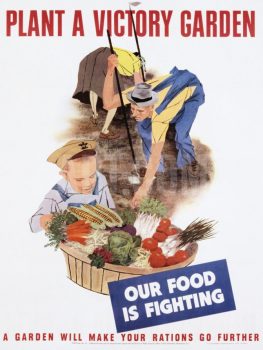 The fact is, the greatest changes come from people, not from government. Once we understand that, once we quit waiting for the “government” to fix things, we gain a sense of empowerment. Gardeners and farmers have always been self-reliant people who pull themselves up by their own bootstraps.
The fact is, the greatest changes come from people, not from government. Once we understand that, once we quit waiting for the “government” to fix things, we gain a sense of empowerment. Gardeners and farmers have always been self-reliant people who pull themselves up by their own bootstraps.
Now is the time to roll up our shirtsleeves.
It’s up to each one of us to create the changes we want to see, starting with our own backyards. We entwine our plans like vines connecting the ground to the sky; we envision a Utopia in which we plant, nurture, and harvest an abundance of roots to fruits; we become attuned to birds and their pre-spring rituals and take note of the first insects; we patrol our grounds for the first emerging bulbs and buds; we listen very closely to try to sense the renewed electrical impulses communicating across fungal mycelial networks, and we feel that increased pulse of life with the gift of light, water, and sun.
We nod and say, “Yes. It is time.” Yes, my friends, this is the time to get out there and kick some you-know-what.
Ready, Set… But what to do first?
Permaculturists like to think in terms of systems. We try to look at the whole picture, think about how things work together, and figure out solutions. We tend to be a peaceful group. Yes, it can be incredibly complex, but basically, it can be oversimplified into two key actions: build the soil and plant lots.
Number One: Build Your Soil
Our food is only as good as the soil in which it is grown. The more organic matter it has, the more it can absorb and hold the water. Plus, soil is a huge storehouse of carbon. Minimize tilling, which releases carbon dioxide in the atmosphere and also disrupts the microbial communities upon which plants depend. Better yet, don’t till at all. Add compost – lots of it. Mulch the heck out of everything. In building the soil and in covering it up with plants and mulch, we sequester more carbon.
Number Two: Plant Lots
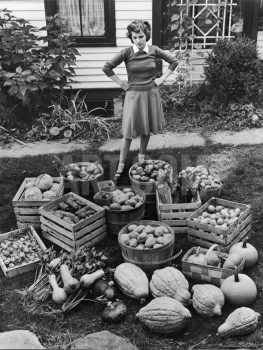 Plant for your family and a bit more to share.
Plant for your family and a bit more to share.- Plant for birds – amaranth, echinacea, sunflowers, shrubs with berries. Let things go to seed.
- Plant for bees and butterflies – all the herbs: lavender, oregano, thyme, and more. Plant flowers of every color to attract a variety of pollinators. Don’t forget milkweeds.
- Plant perennials. Annuals require so much energy, nutrients, and water. Perennials are long-term solutions.
- Plant the natives – they have adapted to what works and support wildlife. They supply food when little else is available.
- Plant trees — everywhere you can. Trees soak up more carbon. Trees even out the climate around them.
- Plant cover crops; leave no bare ground.
- Plant enough for the future – enough to put away and some to save for seed. Plant for the next generation and the generation beyond that.
- Plant in families and patches; build communities. Mix it all up – diversity is vital. Polycultures work; monocrops do not. Plant intensively. The plants are stronger together, and so are we.
Victory Gardens for Political Change
This war can be won – but it won’t be at the political level. It must be won at the Grassroots Level – literally and politically. We must act now to restore, regenerate, and yes, even reverse both what has already been done and the damage that is currently unfolding in tomorrow’s history books. Every person must take part. And we must do even more. We must reach out to the poor, because the poor, in desperation, have put their trust in promises that cannot possibly be delivered. We must reach out and welcome those who are different from us, because as in the garden, that diversity is the foundation of our strength. In the garden, resilience is built by a variety of plants and animals working together, and so must we.
Don’t like the way big corporations control this country? Don’t buy into it – simplify your life and don’t buy their stuff. Refuse to disperse – or consume – poisons. Reduce your personal reliance on nonrenewable resources as much as possible. Allow the Earth to heal. And the biggest thing of all we can do: teach our children.
Victory Gardens for Enlightenment
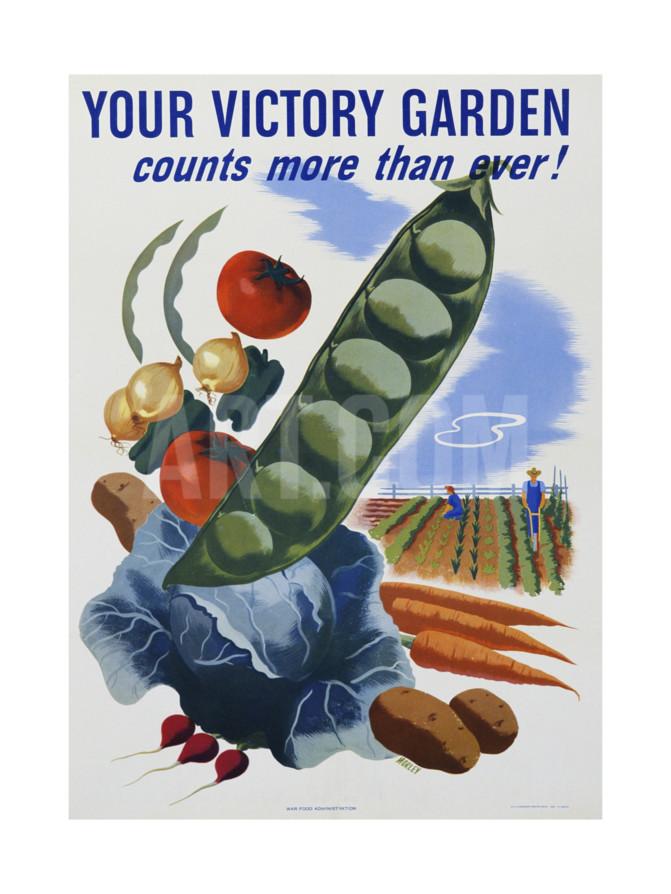 In the garden, we find truths that are, indeed, self-evident. These are honest values, not based on power, pride, or prejudice. The intricacies of nature command our awe and respect, and indeed, even reverence. This unique spinning orb in the universe we call Earth – it is so incredible that we even exist! It is imperative: we MUST take care of this planet. We have no other choice if we want to survive as a species. Earth Care is the first principle in permaculture teachings for a good reason. We must put the needs of the Planet before our own. It requires a certain degree of unselfishness and sacrifice.
In the garden, we find truths that are, indeed, self-evident. These are honest values, not based on power, pride, or prejudice. The intricacies of nature command our awe and respect, and indeed, even reverence. This unique spinning orb in the universe we call Earth – it is so incredible that we even exist! It is imperative: we MUST take care of this planet. We have no other choice if we want to survive as a species. Earth Care is the first principle in permaculture teachings for a good reason. We must put the needs of the Planet before our own. It requires a certain degree of unselfishness and sacrifice.
It is not just the garden that is emerging. We as a human race – with our power to destroy and our power to create – must emerge from a Period of Persephone – a darkness into which we find ourselves rapidly descending. However, unlike the revolution of the planet around its central star, we – you and I – are part of another sort of revolution. We have the power to make this trajectory Stop and turn around. We CAN make it reverse direction.
Now is the time for all good humans to come to the aid of their planet.
Bare your arms. Pick up a shovel. Plant a Victory Garden.
*** ~*~ ***
More on Farming as a Solution to Climate Change:
I encourage everyone to read this paper: Regenerative Organic Agriculture and Climate Change A Down-to-Earth Solution to Global Warming, published by Rodale Press
Also found here: http://rodaleinstitute.org/assets/WhitePaper.pdf
More on Victory Gardens:
Victory Gardens from the National WWII Museum
Wikipedia on Victory Gardens
Year-round Gardening with Eliot Coleman:
The Winter Harvest Handbook and Year-Round Vegetable Production with Eliot Coleman: Book & DVD Set
Interested in Learning More About WWII?
19 of the World’s Best World War II Museums and Historical Sites. Let us never forget or allow again this sad chapter in our history. I don’t usually link to commercial travel sites, but I was contacted by the author, and I feel this is a comprehensive article worth sharing.
Want to Purchase a Victory Garden Poster?
Art.com is the supplier of the artwork above. Simply click on one of the pictures and the link should take you to their website, where if you buy something, I will receive a little advertising kickback at no extra cost to you. Thank you for your support! (and this serves as my required disclaimer) (Aggh! Links are not working at the moment! Will try to fix.)
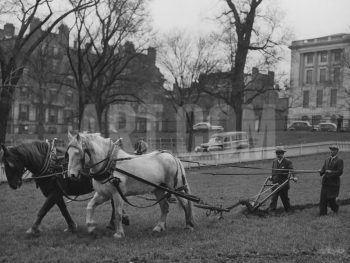
I remember when “Everyone gardened back then…” Growing up in the 50s and 60s my family always had a vegetable garden. Like so many moms, my mother planted, weeded, harvested, froze and canned everything. When I’m out in my garden I usually think of my mom.
Most of our friends and neighbors had gardens then. It’s not the same now, far fewer people garden these days. And the reasons are many.
As far as gardening on the grassroots level – like most home gardeners -we share our surplus garden produce with family and friends but we also share with the local CSFP, commodities for seniors. What a good feeling to make available our home grown vegetables and free-range chicken eggs to seniors who don’t have the space or aren’t able to garden for themselves anymore.
Your commentary is always interesting and appreciated – political, horticultural or otherwise!
What a great idea to share with your local CSFP! I really like that. We have a local food bank that we have given extras to – but it is hard – a lot of people now would rather have something instant – and some organizations cannot accept something that is not in a package. The bears at our nearby “Game Farm” enjoyed some of our surplus apples this year, so at least they didn’t go to waste. Ideally, I like the concept of a “gifting economy” and finding that balance between the need to make a certain amount of money and allowing people to pay what they can afford, not necessarily in cash. I also feel quite privileged to have the surplus to share in the first place. The relationships are more valuable than the monetary return. Best wishes to you, Beth, for a fantastic year in the garden – thanks for taking the time to read my long posts & comment!
Happy 93rd birthday! And thank you for your service during WW II! Hope you have many more wonderful birthdays!
Good health and happiness to you!
Jan and Walt Wielbicki
My dad is an amazing person. I will make sure he sees this. He is quite tech-savvy, and he shares your name, Walt. 🙂 hope your bees are making it through this strange winter!
Not sure I understand your politics. Are you talking about the hundreds of “chicken little” stories about how the sky will fall in IF, IF and IF the big bad man does all those terrible IFs, or are you talking about the damage that has already been done by the “good” ones that just got kicked out by the people? Perhaps, you’re safer to stick to gardening. There’s enough hate mongering going on based on made up suppositions rather than facts. Great garlic to you!
I always enjoy thoughtful discussions. Thank you for your comment and for visiting my site. True, I can’t wait to get my hands back into the soil. Good garlic (and other crops) to you, too!
Blythe, this is an amazing piece of writing, thinking and feeling. Thank you for the reminder, the lesson, the directions and the hope. Well done!!!
Thank you! These kinds of comments keep me going! Although perhaps (as the previous commenter suggested) I should stick to gardening!